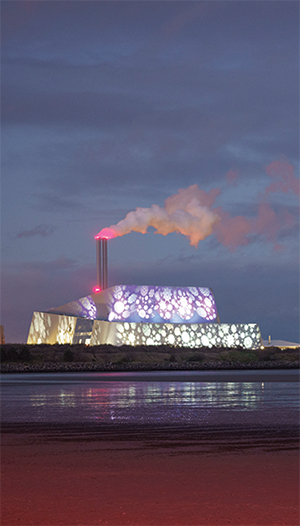Theme 10: Sustainable Environmental Infrastructure and Flood Risk
 Introduction
Introduction
Integrating the delivery of infrastructure with plans for development is essential to ensure that there is adequate capacity to support future growth. This theme addresses a number of issues including water and drainage, surface water, air quality, waste, noise, utilities etc. National and regional policy is increasingly focused on aligning important infrastructure investment with plans for growth and development. As Dublin’s population grows in accordance with the Metropolitan Area Strategic Plan and large parts of the City are redeveloped, meeting the increased demand for infrastructure and services will be an ongoing challenge.
Background and Context
In terms of infrastructural investment, the City Council has advanced a number of projects across the City over the last number of 
 years. A number of flood protection schemes to protect the City from river and heavy rainfall flooding have been implemented and the City is continuing to work with the Government on Flood Risk Management Studies for the City’s Rivers and coastal zones. The Council also recently contributed to the preparation of a regional strategy to improve water quality and achieve ‘good’ ecological status in water bodies and continues to facilitate Irish Water’s (IW) infrastructure improvement projects arising from the Greater Dublin Strategic Drainage Study which will improve treated effluent quality and allow good water quality in the Liffey Estuary and Dublin Bay to be conserved.
years. A number of flood protection schemes to protect the City from river and heavy rainfall flooding have been implemented and the City is continuing to work with the Government on Flood Risk Management Studies for the City’s Rivers and coastal zones. The Council also recently contributed to the preparation of a regional strategy to improve water quality and achieve ‘good’ ecological status in water bodies and continues to facilitate Irish Water’s (IW) infrastructure improvement projects arising from the Greater Dublin Strategic Drainage Study which will improve treated effluent quality and allow good water quality in the Liffey Estuary and Dublin Bay to be conserved.
The Council has also facilitated the delivery of numerous gas and electricity projects over the lifetime of the 2016 Plan enabling the delivery of additional energy capacity across the City in addition to upholding quality standards in respect to environmental safety, public lighting, air quality and noise management.
Dublin City Council was central to the creation of ‘SMART Dublin’ which led to the designation of the Dublin Docklands as a SMART District and a test location for new technologies in the areas of traffic management, sustainable mobility, energy, waste services and environmental monitoring.
Key Issues
Infrastructure Projects
The forthcoming Development Plan will be required to provide policy support for specific strategic water supply and waste-water infrastructure projects identified in the National Planning Framework (NPF) and the Regional Economic and Spatial Strategy (RSES). These critical projects include the Greater Dublin Drainage project, the Ringsend Waste Water Treatment Upgrade/ Expansion project, and the Eastern and Midlands Region Water Supply project.
Irish Water (IW) have responsibility for the provision of water/wastewater infrastructure. Dublin City Council will work with IW and the Regional Assembly to ensure that IW Investment Plan aligns with Dublin City Council Core Strategy and Settlement Strategy.
Policy to Address Climate Change
Given the emergence of new challenges such as climate change, there is now more of a need to ensure our critical  infrastructure –
infrastructure –  such as our drinking water supply – is secure, stable and resilient to risks such as extreme weather events. It will also be important to ensure that our City’s infrastructure is able to withstand, adapt and recover from extreme weather events such as storms and surface water flooding whilst also contributing to de- carbonisation targets which have become an increasingly important focus of national and regional policy. Dublin City Council must ensure that the infrastructure policies of the forthcoming Development Plan deals proactively with these challenges.
such as our drinking water supply – is secure, stable and resilient to risks such as extreme weather events. It will also be important to ensure that our City’s infrastructure is able to withstand, adapt and recover from extreme weather events such as storms and surface water flooding whilst also contributing to de- carbonisation targets which have become an increasingly important focus of national and regional policy. Dublin City Council must ensure that the infrastructure policies of the forthcoming Development Plan deals proactively with these challenges.
Sustainable Water Resource Management
Good planning is critically important to the management of water resources and the planning system influences effective water management both directly and indirectly through water service provision, river basin management, coastal and marine management, and flood risk planning. The Plan will include a strategic flood risk assessment.
The sustainable management of water resources is identified by national policy as a ‘key future growth enabler’ for Dublin. The forthcoming Development Plan will help to achieve this by continuing to support the implementation of flood risk management measures and by providing new and enhanced policy protection for water supply sources and our City’s Rivers. Measures such as Sustainable Urban Drainage Systems (SuDS), which can include green roofs, permeable paving and attenuation areas contribute towards slowing surface water run-off, alleviating flooding and helping to clean the water before it reaches our rivers.
The new Plan will recognise the increasing role of green infrastructure in managing surface water, improving water quality and reducing flood risk which will in turn, enhance biodiversity public amenities and deliver other multiple benefits.
Gas and Electricity Utilities
The National Planning Framework requires that Development Plans provide policy support for the development of enhanced gas and electricity supplies and their associated networks. In practice, this will require the Council to facilitate new transmission infrastructure projects whilst also safeguarding strategic energy corridors - such as ESB power lines and underground gas pipes – from encroachment by other competing forms of development.
The new Development Plan will also be required to introduce policy support for utilities providers to adapt their energy generation facilities and network operations in order to develop new energy generation technology in response to new national decarbonisation, energy transition and energy security policy.
Managing Waste/ Energy
National waste management policy has in more recent times switched its focus from recycling and recovery of waste to reduce landfill and the reuse of waste as a resource. The forthcoming Development Plan will need to consider new policy support for innovative waste treatment and reuse infrastructure and the use of waste treatment process to generate energy (waste-to-energy facilities such as district heating), with an overall focus on a circular economy approach to waste management. There is a new policy focus on the requirement for heat mapping and to support developments which deliver energy efficiency and the recovery of energy that would otherwise be wasted. The forthcoming Development Plan may include a new objective to identify District Energy Zone(s) in Dublin City which would function as Strategic Energy Zones suitable for larger waste energy generating projects.
Digital Connectivity
The NPF recognises that digital data innovation and the prioritisation of investment in high quality digital connectivity infrastructure are crucial to creating a strong economy. The forthcoming Development Plan will need to support the implementation of the National Broadband Plan, the enhancement of international fibre communications links and the promotion of Ireland as an international destination for ICT infrastructures such as data centres – working with infrastructure providers to meet the digital connectivity growth demands of the City. There is also significant potential for the City Council to build on its success with the SMART City SMART Dublin initiative to promote the City as a national demonstrator of 5G information and communication technology.
Air Quality and Noise Management
National and regional policy recognise that air and noise pollution will remain a challenge as our settlements grow and consolidate and that work to improve air and acoustic quality must continue. It recognises that this is best achieved through a multi-sectorial approach to land-use and spatial planning. The forthcoming Development Plan will need to address the need for ongoing monitoring to inform a regional air quality and greenhouse gas emissions inventory. The Plan will also need to take account of changes to relevant noise planning strategies and the Dublin Airport noise zone.
Sustainable Environmental Infrastructure and Flood Risk – Some Key Questions
| 1 | What do you think is the most important infrastructure to support Dublin’s growth? |
|---|---|
| 2 | Do you have any suggestions for how we could better manage the City’s water resources? |
| 3 | Do sustainable urban drainage (SuDS) policies in the Plan need to be further developed and enhanced? |
| 4 | How can the Development Plan best support new energy generation technologies in order to provide more secure and low carbon forms of energy? |
| 5 | How could the Development Plan support more innovative forms of waste treatment, reduction and energy reuse? |
| 6 | How can the Development Plan encourage the provision of high-quality, equally accessible and affordable digital connectivity? |